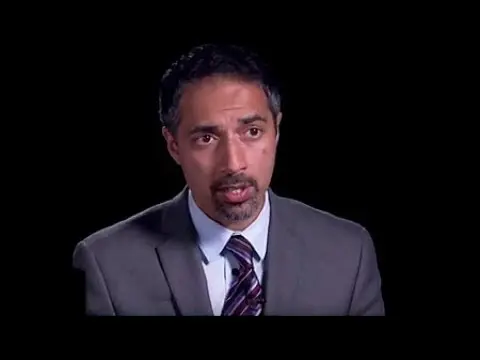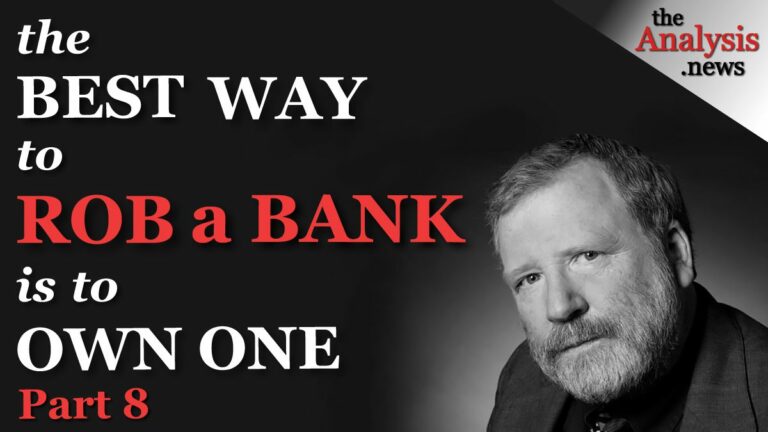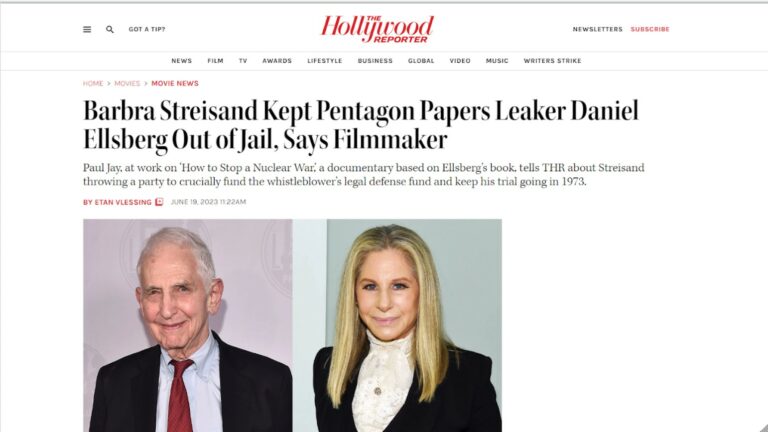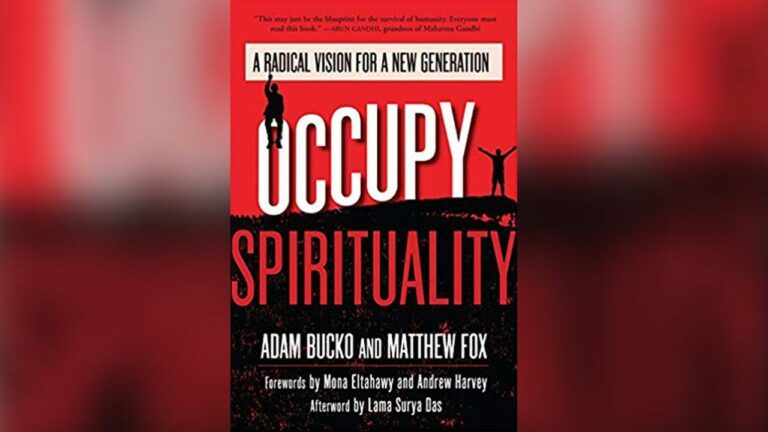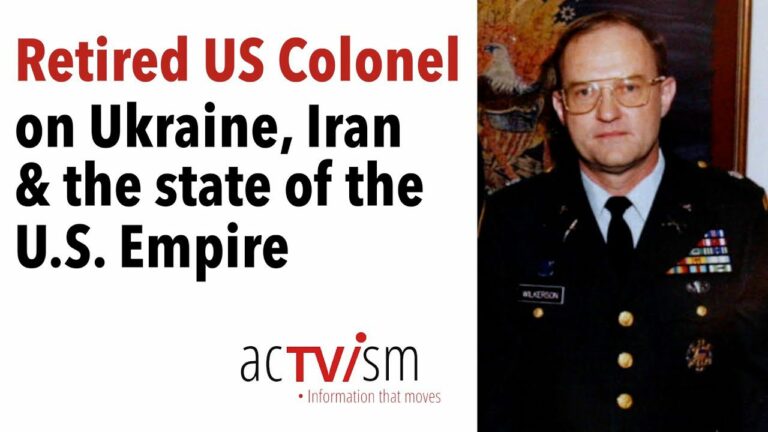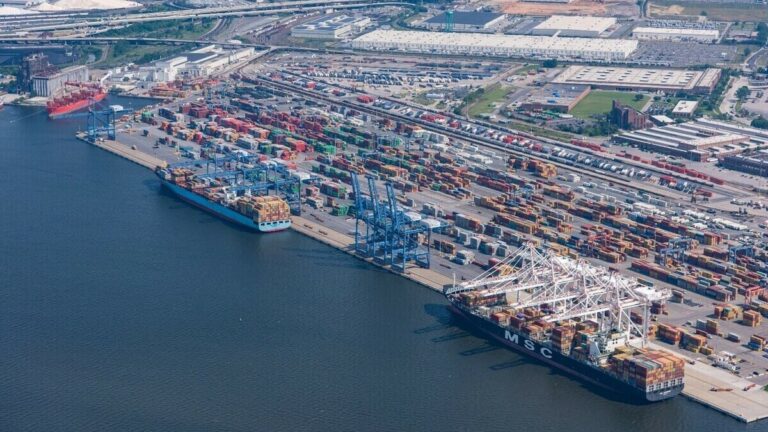U.S. Refuses to Accept Iran as a Regional Power – RAI with Trita Parsi Pt 1/3
From Afghanistan to Iraq, the Trump administration, leading Democrats, and much of the foreign policy and military establishment believe the U.S. should be more aggressive towards Iran. That’s a very dangerous situation that can lead to war, noted Iran expert Trita Parsi tells Paul Jay on Reality Asserts Itself. This is an episode of Reality Asserts Itself, produced August 21, 2017, with Paul Jay.
STORY TRANSCRIPT
PAUL JAY: Welcome to The Real News Network and welcome to Reality Asserts Itself. I’m Paul Jay. Usually on Reality Asserts Itself we start with a kind of biographical story of our guest. But we’re gonna go a little differently this time. We’re gonna deal with some more of the news and our analytical take on it because the news is just so pressing about what we’re gonna talk about. And what we’re going to discuss is the United States’ attitudes towards Iran. If there’s one thing the Trump administration foreign policy has been clear about, and there’s been a lot of ambiguity about just what its foreign policy really is, the one thing it has been clear about is its hostility to Iran. And we’re gonna try to understand why. ‘Cause it’s not just the Trump administration, it was pretty much the same for all American administrations since the Iranian Revolution. So now joining us to discuss this, and particularly today our first segment because tonight, and as we record this, President Trump is going to make a statement on Afghanistan … So we’re gonna start, because of that, we’re gonna start with U.S.-Iranian relations as it relates to American policy in Afghanistan. Now joining us in the studio is Trita Parsi. Trita is founder and president of the National Iranian American Council. He’s the author of the award-winning books, “A Single Roll of the Dice–Obama’s Diplomacy with Iran,” and “Treacherous Alliance–The Secret Dealings of Israel, Iran, and the U.S.” His most recent book is, “Losing an Enemy–Obama, Iran, and the Triumph of Diplomacy.” Thanks for joining us.
TRITA PARSI: Thank you for having me.
PAUL JAY: Yesterday, the Washington Post had an editorial, and while it recognized that the nuclear agreement is working and Iran is abiding by its side of the agreement, it harshly critiques the Trump administration, strangely enough, for not confronting Iran in terms of the Iranian influence in Iraq, the Iranian influence in Afghanistan, and for allowing its allies to fight a useless war in Yemen. Mostly, that the Trump administration’s not being aggressive enough. I’m just gonna read the first paragraph of the Washington Post piece: “Despite much heated rhetoric, the Trump administration is doing little to counter Iranian aggression. In Syria, its strategy of striking deals with Russia has opened the way for Tehran’s forces to establish control over a corridor between Damascus and Baghdad. In Afghanistan, Iran is steadily building a strategic position even as President Trump balks at a plan to strengthen U.S. support for the Afghan government.” Well, combine this with the New York Times, which has just recently had several articles about, first of all, Iranian domination of Iraq, and then it talks about the Iranians are now supporting sections of the Taliban and arming and training them. The drumbeats coming from the New York Times and the Washington Post, strangely enough, are even more aggressive than what’s been coming from the Trump administration. What do you make of all this?
TRITA PARSI: Well, in the book I do describe and explain that at the end of the day, this nuclear deal was about so much more than just the nuclear issue. Ultimately, it was about whether the United States would recognize Iran as a major player in the region, or whether it would continue a more than three-decade-long policy of almost total isolation and containment of Iran. The nuclear deal essentially, by virtue of being a deal with Tehran, put an end to that. And the Obama administration was actually actively working to make sure that Iran had a seat at the table when there were negotiations about Syria, et cetera. The real opposition that came both from the Saudis as well as the Israelis was primarily because not of the deal itself, not of the details of the deal, but the geo-political repercussions of the United States no longer being a lethal enemy of Iran. But recognizing that whether we like it or not, Iran is a major power in the region and you have to deal with it and you have to recognize that it does also have legitimate interest. Now we’re seeing all of these articles and commentary coming out that frankly is a little bit more honest about some of the opposition that existed against the deal. Because what they’re afraid of and what they’re arguing that the United States should be much more aggressive about is that just because there’s a nuclear deal does not mean that the United States should not confront Iran in Syria, should not confront Iran in Yemen, or in Iraq. So we’re seeing that it’s coming to the core of what is the U.S.’s own role in the region? Should it continue to have a position of hard hegemony in the region in which it automatically will be on the opposite side of Iran and on the side of Saudi Arabia and Israel, who has been the main benefactors of U.S. hegemony in the past? Or should it pursue a policy in which it actually recognizes that there’s plenty of blame to go around in the Middle East and all of these major powers need to find a way to get along and resolve their differences instead of them thinking that they can use the United States as a proxy in order to score points in their own internal rivalries? That’s what this really is about at this point. And we’re seeing that some folks may not have fully recognized the repercussions of the deal, and now they’re quite much, perhaps one can say, overreacting to some of the realities that was quite inevitable that would come with this deal.
PAUL JAY: Because of the Trump statement that’s coming, which we assume is gonna support a certain number of more troops, they’ve been kicking around 4,000 extra troops going to Afghanistan, there’s some talk of the American military, Pentagon actually want to even have much more significant troop increases in Afghanistan, let’s talk about that. Now the New York Times a couple of weeks ago had an article that talked about the Iran apparently, according to the New York Times, is training sections of the Taliban, which is somewhat counterintuitive because of the supposed Sunni-Shia division. But according to this article, in spite of that, Iran is now using sections of the Taliban to weaken the American position in Afghanistan and, as it said in that Washington Post article, create a kind of beachhead for Iran in Afghanistan. What do you make of that?
TRITA PARSI: Well, I think if we talk about Afghanistan in particular, we have to remember that the United States and Iran work closely together to defeat the Taliban. The Iranians had been opposed to the Taliban even at times when some U.S. money was going to elements there. And the Iranians were very upset just a couple years ago when the U.S. was softening its position on the Taliban and argued that the Taliban should be negotiated with. The Iranians were very much against that. I think what has happened in Iraq and Afghanistan that explains some of the difference in the Iranian posture vis-à-vis Afghanistan compared to Iraq is that in Iraq the Iranians were successful in pressuring the Iraqi government not to agree to a status of forces agreement with the United States, a SOFA, that would enable the United States to have its troops in Iraq and be above Iraqi law. Once that SOFA wasn’t signed, the Obama administration felt that it would be too risky to have a very heavy military presence there. In Afghanistan, the Iranians failed, and the Afghan government did sign a status of forces agreement. As a result, it is much easier for the United States to have troops there, much less costly in terms of political and legal aspects of it, and potentially even have permanent bases there. Particularly because of the very intense hostility between the United States and Iran, which under Trump has intensified, the Iranians do not want to have American troops anywhere near their borders. So it would not be that contradictory to past patterns that the Iranians would pursue policies in Afghanistan that would undermine the U.S.’s position there precisely because they don’t want the United States to have an ability to attack Iran from Afghanistan or from Iraq.
PAUL JAY: I mean, let’s not forget … And for some of the younger viewers that may not know the history, it was American policy that helped create the Taliban in the first place. Brzezinski and Carter policy of sucking the Russians into what was supposed to be Russia’s Vietnam. I guess in some ways it was. But the Taliban through the Pakistani ISI and the CIA was very much a creature of American policy.
TRITA PARSI: Ronald Reagan called them heroes.
PAUL JAY: And this is a great threat to Iran to have this kind of fundamentalist Shia power in Afghanistan.
TRITA PARSI: But what it does show is that to the extent that U.S.-Iran tensions are going in a negative direction, wherever the two actually end up in the same arena it will lead to those arenas becoming intense areas of competition and rivalry between the United States and Iran. If this wasn’t the case, if the Trump administration had pursued a different policy and if the military option against Iran had really been taken off the table, I suspect that we could have seen a very different posture by the Iranians in Afghanistan, as we have seen it elsewhere when the U.S. and Iran actually collaborated. But the more we’re going in a negative direction, unfortunately, I think it is quite likely that the Iranians are going to set aside ideological differences and work towards ensuring that the U.S. never ends up in a position in which it would be able to take military action against Iran from areas very close to its borders.
PAUL JAY: Which of course includes Iraq. ‘Cause it’s also a New York Times’ piece about how Iran is asserting its domination in Iraq and so on, but I guess for somewhat the same reasons. In fact, we’ve several times quoted Trump. He spoke at the CIA just after his inauguration where he kind of jokes about how America should’ve kept the oil in Iraq. And then he jokes to the CIA: I think you’re gonna get another chance to go get that oil. I mean, openly talking about going back into Iraq to seize the oil. If they’re serious about that, you gotta go back in some numbers. But mostly it seems to be they want to counter Iranian influence in Iraq.
TRITA PARSI: So a lot of other countries in the region are very frustrated with the United States because they believe that by going into Iraq in the first place and to taking out the Taliban, the United States is quite guilty of unleashing Iran because these are two powers that were essentially balancing Iran.
PAUL JAY: Which most of the people that knew the region said prior to the invasion that that’s what was gonna happen.
TRITA PARSI: They did. And in fact the Saudis were very explicit in warning the George W. Bush administration that if you go into Iraq, you are gonna essentially end up increasing Iranian influence. One Saudi official very angrily told me that the Americans gave Iraq to Iran on a silver platter. Reality is though that because the U.S.’s failure in Iraq, the vacuum was created. And various parties, including the Saudis, have been vying for control and influence there. And they largely all lost out to the Iranians who have been more effective, more clever, and actually particularly much better at taking advantage of the other side’s mistakes. It’s not so much that they had the smarter strategy, it’s just that their strategy wasn’t as incompetent as the strategy of others. And as a result they’ve been winning out. Ultimately though, I think it’s gonna be very difficult for the Iranians to retain that degree of influence in Iraq. Iran and Iraq historically, just because of geo-political realities, have often times been rivals rather than partners. But the panic we’re seeing right now over the idea that Iran is gaining influence in these various areas is actually going back to a question that is rarely openly discussed in Washington, D.C.: Does the United States want to be the hegemon in the Middle East? Is that just taken for granted? And if so, if it actually explicitly wants to be the hegemon in the Middle East, what is the cost and what is the benefit? What is the cost-benefit analysis there? The Obama administration actually was quite clear on this point. They believed that the Middle East had lost a tremendous amount of strategic significance for a whole set of reasons including of course that the value of the oil there had declined as a result of the U.S. being able to produce much more through shale oil, et cetera. Moreover, the administration under Obama felt that the real challenge to the United States would not come from any country or movement out of the Middle East, but it would come from China and that the United States was being overextended in the Middle East and under committed in East Asia. They wanted to pivot to Asia. So they very explicitly told the Saudis, for instance the president did, that the United States is trying to resolve its tensions with Iran, and he suggested to the Saudis: You should do so as well. But the Saudi position was, “No, we want you to be the hegemon in the Middle East. Yes, you will pay for it through your blood and treasure, but we’ll cover some of that treasure at least. But we want to be under an American hegemonic umbrella.” And this is where we clearly see that there’s a divergence of interest from a global perspective between the United States and some of its core allies in the region.
PAUL JAY: Sections of the United States.
TRITA PARSI: Exactly.
PAUL JAY: Sections of the foreign policy establishment.
TRITA PARSI: You’re quite right. You’re quite right.
PAUL JAY: Sections of capital. Because the fossil fuel industry, I think and people I’ve interviewed and talked to, they want another play in Iraq because there’s so much sweet crude unexploited in Iraq.
TRITA PARSI: Without a doubt, you’re correct in saying that there’s sections that want this and there’s sections that actually still want to go-
PAUL JAY: But the longer-term play is about China. But the shorter-term play, and that seems where the Trump administration is focused, is on the energy side. And the energy side is: Go back and get the oil from Iraq. It’s the alliance with the Saudis and it also has its own metaphysical, ideological side. Steve Bannon’s articulated it the best. But it sounds like Trump believes in this stuff. ‘Cause this fight against Islamic terrorism, Islamic fascism, it’s really a misnomer because you don’t … If you’re really against Islamic fascism and Islamic terrorism, you would focus on the Saudis.
TRITA PARSI: Certainly.
PAUL JAY: This is all anti-Iranian rhetoric dressed up as anti-Islamic terrorism. So the whole philosophical-
TRITA PARSI: But the part of it that is still not clear to me though … I agree with what you say that several elements still want that hegemony. Why they want it is not entirely clear to me. If it is because of the oil-
PAUL JAY: Short-term money.
TRITA PARSI: Well, that’s where the cost-benefit analysis doesn’t make a lot of sense.
PAUL JAY: Well, it depends if you’re talking about the systemic interest of the United States or the narrow interest of a narrow sector of capital.
TRITA PARSI: And narrow interests that would perhaps be as narrow as the Trump administration’s own Trump investments, perhaps yes. Because-
PAUL JAY: Or, Tillerson’s Exxon or … There are certain sections of capital that would.
TRITA PARSI: Certainly.
PAUL JAY: Especially if you’re fossil fuel because you’ve only got-
TRITA PARSI: But I don’t think it’s only them. What we have is also folks in the Pentagon that without any connection to these other types of interests seem to have an approach and a definition of the interest in which it doesn’t matter how valuable the Middle East is right now, we simply don’t retreat–that’s not what we do.
PAUL JAY: I agree with that. That’s a big … We don’t lose.
TRITA PARSI: We don’t lose. We just never take a step back. And it doesn’t matter how negative the cost-benefit analysis is, they just don’t wanna do it. Whereas I think the calculation on the Obama side was, is that this doesn’t make a lot of sense any longer. We are actually keeping our eye off the ball by not focusing on Asia, and we need to shift over there. And Iran was a very critical piece because one can criticize Obama on several different points. One criticism that hawks give is that he never went into Syria, and he had promised to or he had the red line. But Syria was never as dangerous from the Obama perspective in the sense of being able to drag them into yet another unwinnable Middle Eastern war as Iran and the nuclear program was. The fear that the nuclear program would lead to a military confrontation that would drag the United States in it too, something that the president clearly didn’t believe would have a long-term military solution, was so much bigger. And that’s why the Obama administration ended up spending so much political capital in trying to get a deal on the nuclear issue. ‘Cause it was a critical piece in at least trying to make sure that the pivot to Asia would work.
PAUL JAY: Well, it’s interesting in that Washington Post piece that I quoted upfront, it defends the deal and it says the Iranians are abiding by the deal, and it actually critiques the Trump administration while it says it’s not being aggressive enough on Afghanistan, Iraq and so on, it critiques them for wanting to undermine the nuclear deal. So even the hawks defend the deal.
TRITA PARSI: And this is where there’s a disconnect in my view. There is a belief that you can keep the deal and be even more aggressive on other issues. The deal, by design or not by design, nevertheless constrains both sides. It constrains the Iranian on non-nuclear issues, and it constrains the United States as well. The idea that the United States could adopt a much, much more hawkish policy in the region and push back against Iran here and there and still be able to keep the nuclear deal, I don’t think is feasible. I think in order to be able to ensure that this deal lasts a minimum of those 15 years, there has to be a positive trajectory in U.S.-Iran relations as a whole. But here’s the thing, that does not mean that the United States necessarily would have to accept some of Iran’s policies in the region. There probably are areas in which there should be pushback, et cetera. But we now have a blueprint in which we can see what is effective with Iranians and what is not. We have no other example in which the United States has been able to engage in a process that dramatically changed Iran’s policy except for the nuclear negotiations. We have a successful case and the Trump administration right now, as well as many of the commentators whether it is the New York Times or Washington Post, are advocating for a completely different approach. An approach of confrontation and pressure that has never worked anywhere with the Iranians. This is the mystery to me. If we truly want to see a change in Iranian policy in the region–whether it’s in Syria, Iraq, or Yemen–there is a negotiated path in which that can be achieved. But it requires something that I think very few people in Washington are willing to accept. For the Iranians to change their policy as they did on the nuclear issue, the United States also needs to change its policy as it did on the nuclear issue. It has to be a compromise. It has to be a give and take. But Washington is rarely in a compromising mood.
PAUL JAY: I think what happens is that the section of foreign policy establishment and capital that was previously best represented by Dick Cheney, their play is short term, it’s about fossil fuel, it’s about military-industrial complex, and it’s not the long-term systemic global power play. Because if you really had that vision, you never would’ve invaded Iraq. In fact, Obama said that, I believe in the first presidential election, he said … Someone was asked: Would you accept Iran as a regional power? And he said: Well, it’s too late for that question ’cause if you didn’t want to accept Iran as a regional power, you shouldn’t have invaded Iraq. That horse has left the barn. So he accepts that.
TRITA PARSI: But let’s just stop there. But let’s just stop there. How could that even be a question? Are you willing to accept Iran as a regional power?
PAUL JAY: As we’re talking to the global hegemon, right?
TRITA PARSI: We’re talking about … The problem here is the tremendous unrealistic positions that has been taken by the United States and others when it comes to Iran. Iran is a giant in the region. There’s never been a sustainable, stable order in the region that did not include either them or any other country of that size. We see that in the European experience. Ultimately, in order to be able to have stability in Europe, Germany had to be one of the pillars of that stability. Any effort to exclude it would spell disaster. Whether the Germans are right or wrong is a different story. The story is, you cannot have a regional order that is sustainable and indigenous, meaning that it can stand on its own legs, without having the core powerful states in the region be included and be pillars of that. So the idea that one could have a prolonged state of balance of power in the region, an equilibrium, that is based on Iran’s exclusion, would only work if the United States pays for it with its blood and treasure. And even then it would still have a very short expiration date. But that’s exactly what the Saudis and the Israelis wanted the United States to continue to do. After the Iraq war, it became quite clear the United States had weakened itself to the extent that it no longer could re-establish such an order. And that’s where you see a significant diversions between Israel and Saudi Arabia on one hand and the United States on the other hand.
PAUL JAY: Section of the United States.
TRITA PARSI: Sections of the United States.
PAUL JAY: Because the Cheney philosophy is back in power.
TRITA PARSI: It is. There is that philosophy to saying: Well, the only reason why it hasn’t worked is because we haven’t been tough enough; we haven’t poured enough money and military means onto this problem. If we just did that, it would work.
PAUL JAY: The reason Iran filled the vacuum is ’cause the vacuum was created by pulling out American troops, according to this line of thinking. Keep a massive American troop presence in Iraq; Iran never gets that position. The answer is, get troops back in. You talk about not backing out-
TRITA PARSI: I have to say, to some extent I’m not entirely sure whether this is driven by fossil fuel industries and-
PAUL JAY: I think it’s many factors.
TRITA PARSI: But one of the core factors that are always been there and are very visible, is that that’s the line of some of the allies of the United States in the region who have been the main benefactors of U.S. hegemony in the region. They look back to the era pre-2003 with tremendous nostalgia because that’s the point in which the U.S. was strong enough that it was isolating Iraq and Iran, it was relatively stable, particularly compared to today. And in their view, although not all of them are saying it explicitly, it was the United States that destroyed that order by going into Iraq in the first place.
PAUL JAY: It seems the plan, and they openly articulate it, “they” being some of the Trump foreign policy spokespeople and certainly people in congress who are on this page and Steven Bannon types … I think they believe that they can create in Iran another Iraq. In other words, destabilize, unleash civil war, and try to destroy that society with bringing back sanctions. I mean, the reason for undoing the nuclear deal is not ’cause they think Iran hasn’t abided by it, is they want sanctions. They want to destroy the economy. They want to create the grounds for turmoil in Iran. And why? So in the next segment of our interview, we’ll talk about just what this strategy looks like and just how real is it. ‘Cause they thought they win in Iraq, and that didn’t work out so well. Please join us for the next segment of Reality Asserts Itself with Trita Parsi on The Real News Network.
Podcast: Play in new window | Download
